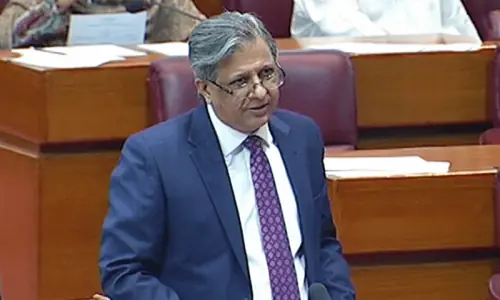WASINGTON: US Secretary of State Antony Blinken said on Sunday that the United States will only recognise a future government in Afghanistan if it upholds basic rights of its people and keeps terrorists out of the country.
Asked to comment on media reports that China was ready to recognise the Taliban as a legitimate government, Secretary Blinken said: “A future Afghan government that upholds the basic rights of its people and that doesn’t harbor terrorists is a government we can work with and recognise.”
Conversely, he added, “a government that doesn’t uphold the basic rights of its people, including women and girls; that harbors terrorist groups that have designs on the United States or allies and partners — certainly, that’s not going to happen.”
The top American diplomat appeared on a number of US television channels on Sunday to comment on the developments in Afghanistan where Taliban insurgents have entered Kabul, forcing President Ashraf Ghani to seek refuge in Tajikistan.
Read: 'Taliban have won': Ashraf Ghani says fled Afghanistan to prevent bloodshed
He warned that international assistance to a Taliban-led government in Kabul “will not be forthcoming, sanctions will not be lifted and their ability to travel won’t happen” if they did not respect basic rights and did not stop harboring terrorists.
When the interviewer argued that his statement sounded like a no to recognition, Mr Blinken said: “It’s incumbent on the international community, including the United States, to do everything we can using every tool that we have — economic, diplomatic, political — to ensure (those) rights are sustained.”
He also emphasised the need to ensure that “if the Taliban does not do that … it clearly faces the penalties for not upholding those rights,” adding “We will do everything we can to make sure that’s the case.”
CNN’s Jake Tapper reminded Mr Blinken that in a recent statement, US President Joe Biden had insisted that the Kabul government would not fall and asked him how the president could “get this so wrong.”
The secretary argued that the US had accomplished its goals in Afghanistan, by dealing with the folks who attacked us on 9/11, eliminating Osama bin Laden in 2011 and diminishing the threat from Al Qaeda and now was the time to leave.
Quoting a former US ambassador to Afghanistan, Ryan Crocker, that the withdrawal of US troops was “a handover to the Taliban” that left the Afghan people “hung… out to dry,” the journalist asked: “Does President Biden not bear the blame for this disastrous exit from Afghanistan?”
Mr Blinken replied, “We have said all along, including the president, that the Taliban was at its greatest position of strength at any time since 2001 when it was last in charge of [Afghanistan].
That is the Taliban that we inherited. And so, we saw that they are very much capable of going on the offensive and beginning to take back the country.”
He pointed out that the US spent billions of dollars, “building a modern military with sophisticated equipment, 300,000 forces strong, with an air force that the Taliban didn’t have. And the fact of the matter is, we have seen that that force has been unable to defend the country.”
Secretary Blinken also rejected the suggestion that sending American troops to evacuate US Embassy staff and other Americans resembled the hasty US evacuation from Vietnam.
“Remember, this is not Saigon,” he said. “We went to Afghanistan 20 years ago with one mission. And that mission was to deal with the folks who attacked us on 9/11. And we have succeeded in that mission.”
Published in Dawn, August 16h, 2021
































